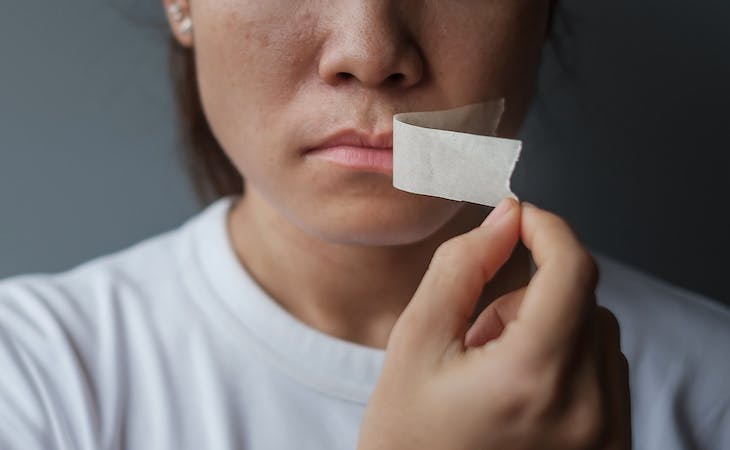If you’re on TikTok, you’ve probably seen a viral video or two about mouth taping. Fans of the practice say training yourself to breathe through your nose while sleeping can improve everything from snoring and sleep apnea to bad morning breath.
But is there any research to support mouth taping for sleep? And what do doctors say about the wellness trend? Here’s what you need to know about the safety and effectiveness of taping your mouth shut for the night.
What is mouth taping?
Mouth taping is pretty self-explanatory. It’s when you tape your mouth closed before going to sleep. The idea is to force yourself to breathe through your nose instead of your mouth.
Research suggests chronic mouth breathing increases the risk of sleep disorders. So the theory behind mouth taping is that training yourself to breathe through just your nose could lead to healthier, better sleep.
This home remedy for snoring and other sleep issues has gotten popular thanks to viral TikTok videos from wellness creators and the 2020 New York Times bestseller Breath: The New Science of Lost Art.
Does mouth taping for sleep have any real benefits?
Despite the TikTok buzz, there aren’t any studies proving mouth taping works for snoring, sleep apnea, or bad morning breath. A 2009 study also found that mouth taping doesn’t improve asthma.
“There’s not enough evidence to suggest that mouth taping has any real benefits when it comes to sleep,” says Shelby Harris, PsyD, sleep medicine specialist and director of sleep health at Sleepopolis. “It’s not something I recommend to anyone who is using it as a way to reduce snoring or mouth breathing.”
Still, a 2015 study of 30 patients with habitual open-mouth breathing found success with a modified version of mouth taping. The study participants wore a three-layer, porous patch over their mouths at night. When the results were in, researchers concluded that the patch improved mouth breathing, reduced snoring, and could be used to treat mild obstructive sleep apnea.
More research in 2022 involved taping patients’ mouths to test a device for evaluating sleep apnea. The test was successful, meaning mouth taping might be helpful in the diagnosis—but not treatment—of sleep apnea.
Is mouth taping safe?
More research is needed to know whether or not mouth taping is safe. What we do know is that a taped mouth limits your ability to take deep breaths. This could be unsafe and uncomfortable, especially if you’re already experiencing obstructed breathing. There’s also the potential for skin irritation or even an allergic reaction to tape adhesive.
Harris says to avoid mouth taping if you have sleep apnea symptoms, including snoring, trouble staying asleep, waking up with mouth dryness, or irregular breathing while sleeping.
“Sleep apnea is a condition where the airway is fully or partially blocked during sleep and oftentimes results in loud snoring or mouth breathing as a way to increase airflow,” she explains. “Taping the mouth closed during the night can further restrict airflow…[resulting in] greater risk for serious health complications.”
FAQs
Can mouth taping help sleep apnea?
No. Mouth taping might actually make breathing more difficult in people with sleep apnea, according to Harris. The potential reduction in oxygen levels also increases their risk of developing more severe health problems, including sleep disorders.
Is mouth taping for sleep safe?
There haven’t been any studies to prove that mouth taping for sleep is a safe practice. It’s particularly risky for people with sleep apnea.
Does mouth taping help with sleep?
There’s no scientific evidence that mouth taping helps with sleep, and it might even make deep, restful sleep more difficult. Most research is around the effectiveness of porous sleep patches or whether temporary mouth taping can help doctors assess sleep apnea.
What tape do you use for mouth taping?
Harris doesn’t recommend mouth taping at all. But if you’re going to try it anyway, be sure to use a porous tape designed for human skin, such as kinesiology tape.
The bottom line on mouth taping for sleep
Overall, there are more risks than proven benefits when it comes to mouth taping for sleep. If you’re already experiencing heavy snoring, restless sleep, or other signs of sleep apnea, be sure to talk to your doctor before even attempting mouth taping.
While one small study did suggest that a porous oral patch can improve common sleep problems like snoring and mild sleep apnea, it’s important to note that researchers used a specially designed, three-layer patch—not actual tape.
If you’re experiencing sleep issues of any kind, it’s better to talk to your doctor than attempt an unproven remedy like mouth taping.
When should you go to a sleep specialist? Here’s our guide to visiting a sleep doctor.




